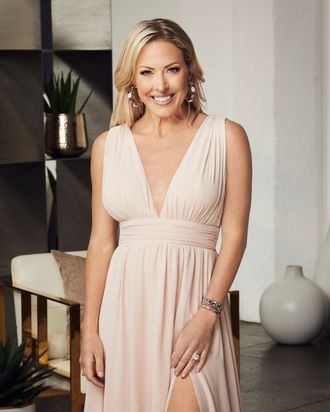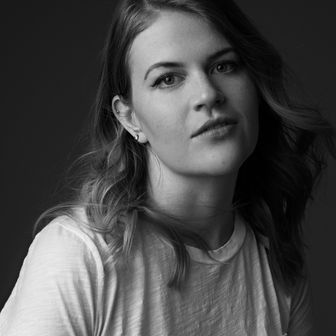
It feels melodramatic and a little embarrassing to say that I cried during an episode of the Real Housewives. But I did. Twice, actually. It was during the first episode of the most recent season of the Real Housewives of Orange County, Bravo’s original and longest running series in its flagship Housewives franchise. In it, Braunwyn Windham-Burke, the hard-partying mother of seven, admits to a friend that she has a problem with drinking. Then, in a confessional, she says simply: “My name is Braunwyn, and I’m an alcoholic.”
I had been sober myself for about a year and a half at the time, and still, hearing someone say those words moved me as much as when I heard them at my first meeting. What followed was a season that tracked all the ups and downs of Braunwyn’s first months of sobriety. Later, in the show’s finale, she came out as gay. “To be able to be comfortable in my own skin after so long is just so nice,” she said in a December interview with GLAAD.
Early sobriety is a period of time that can be tumultuous for any alcoholic. We live in a culture that glamorizes and celebrates alcohol and where so much social interaction centers around drinking. Extracting yourself from that and finding ways to fill the spaces in your life that had previously been occupied by booze can be difficult and isolating. And that’s in the best of circumstances. Being on-camera and part of a show that is built on drunken brawls and throwing drinks in people’s faces is not the best of circumstances. To learn more about what that experience was like, I spoke to Braunwyn over Zoom one afternoon about navigating the early days of her sobriety in such a public way, what it was like to come out as gay shortly after, and what sobriety feels like a year in.
You quit just days before filming, right?
January 30 is my sobriety date, and we started filming February 10.
Wow. How did the upcoming season factor into your quitting?
I think anyone that goes through sobriety knows you have a few moments. This is my third time getting sober. I knew I had a problem, but since I’d just taken such a long break — seven, eight years of not drinking — my alcoholic brain said, You’re okay, you’re fine. And as I was filming season 14, it became increasingly obvious I was not okay. I was blacking out; I wasn’t remembering things. I would joke about it, but it’s not funny when you’re almost not let on an airplane.
Miami was my final drinking binge. On the plane, I was like, Okay, I’m not going to drink in Miami. Then, lo and behold, two minutes after we land, I’m drinking in Miami. The last day there was not pretty; the people close to me were concerned. They were calling Sean [Braunwyn’s husband] like this isn’t okay. I think knowing that I was going back to work and that my life had become unmanageable, I knew I could no longer manage the drinking. I had this moment of clarity: This is your last drink.
I went and I got Sean and I broke down, and he literally sat on me because I was going through withdrawal so bad. I don’t recommend anyone does that. Detoxing by yourself is unsafe. I always want to reiterate that wasn’t a smart choice. I should have done it in a hospital setting.
I reached out to Captain Sandy from Below Deck because I’m good friends with her girlfriend, and I knew she was sober and in the same industry. She said something that changed the trajectory of my life, which was: “You had no problem being so drunk on-camera; why are you so scared to be sober?” She said that it’s the accountability — if you say you’re an alcoholic, on-camera, you have to be accountable. I realized I needed that. And I didn’t take a pause between my conversation with her and calling our showrunner and saying, “I’m an alcoholic, I’m getting sober.” And he said, “Do you want to do this on-camera?” I said, “Yes I do. Let’s do it real. Let’s do it honestly.”
It was interesting watching you because I thought back to my early months of sobriety, and those months are so raw. The way I describe it is that I felt like my skin was inside out. And the Housewives franchise is built on big, emotional moments and intensity and conflict. What was it like navigating that when you’re already also dealing with all the challenges of early sobriety.
Every day was hard. But I really wanted to show the reality of it. Not like, “I’m sober, life is great!”
I was in my head a lot. I was crying a lot. I was raging. I was feeling all of the feelings that I hadn’t felt in a long time. And I was doing them on-camera. You guys got a small glimpse of what we film, but I basically had a producer in my home almost nonstop catching those real, raw moments. I was very blessed that this particular producer was a member of AA and had been honest with me about that, so it let my guard down a lot. I felt a lot of trust toward the people I was working with, but it was like you said, like my skin was on inside out. There’s one scene — it’s still hilarious — I have two different earrings on. That was not on purpose. That was just my mental state. I couldn’t do my hair or my makeup. Little things were hard. And here I am trying to film a TV show. It was harder than I anticipated.
Some people have complicated feelings about the word alcoholic. It’s a word that comes with all this baggage and all these stereotypes attached to it. What is your relationship to the word?
For me, it’s freeing. Saying “I’m an alcoholic” takes this huge burden off of me. I don’t have a problem with drinking. I’m an alcoholic. I can’t drink. And that to me is so nice. I don’t have to manage it. I don’t have to come up with rules. I’m just not going to drink today. It’s so simple. I don’t feel shame in it. I don’t think there’s a stigma to it. I’ve really been cognizant of owning that word because it is who I am. Like, I have blond hair; I’m an alcoholic.
There’s a way in which you have to “come out” as an alcoholic. Especially in the early episodes this season, you were having this conversation about your sobriety with people again and again, and sometimes you were outed before you were ready, like when your mom told Tamra. And then, later that season, you came out as gay. What were those two “coming out” processes like?
When I came out as an alcoholic, a lot of people in my life were relieved and happy. Anyone that’s close to me knew I had a problem, especially my mother. So that was much easier for me. Coming out as being gay, as being a lesbian, that is hard. I wish we lived in a world like in Schitt’s Creek, where it’s not an issue, but it still is an issue. I live in a very conservative town, and I still get a lot of criticism.
I think, culturally, women have been taught for thousands of years that you get married, you have children, and that’s where you need to find your happiness. If you want more, there’s something wrong with you. When I was getting sober, people were happy because I’m a better mother and wife if I’m sober. Being gay, that has not gone over well with a lot of people because that’s been equated with me not being a good mother. And that is something that I can’t fix. It’s been hard. Being sober is much easier than being gay.
There was some pushback against you getting sober on the show. Some people made comments about you being more fun before. I think in America we conflate fun and drinking so much.
We are inundated with that message. In high school, a fun party is a drinking party. Society puts that on us from the time that we are born. Was I more fun drinking than I was during those first 90 days of sobriety? Yeah. Those first 90 days weren’t fun. I was an emotional wreck. Am I more fun now? 100 percent. I can stay awake. I remember stuff. But also, my idea of fun has changed. I’ll go to dinner and have a great time, and then when everyone goes off to the bars with the after party, I go home. I leave before it gets messy and all the crying and the fighting. I don’t want to be there for that. And I surround myself with people that understand when I say good night, I’m leaving. Am I as much fun to people that are drinking heavily and getting sloppy? Probably not, but I’m more fun to me, and that’s all that matters.
How are you feeling about your sobriety a year in?
Some days I love it. Some days I don’t. Today was one of those days. I’ve been sad the last few days, and I can’t figure out where it’s coming from. It’s just a general feeling of apathy. And I was like, I miss drinking. I missed the crazy. I missed the break from the mundane. Not to say that I’m going to drink; I’m not. And I know what to do. I go to a meeting, I call my sponsor. I journal, I meditate. I work out. I know what to do. But it’s still there sometimes. I wish I could say, “It’s great! Every day is amazing!” But there are some days where I’m just sad and I miss the crazy. And it’s okay. I acknowledge that it’s okay to say, today it sucks being sober and that’s okay. I’m still not going to drink today.
Is there anything else you want to add?
The one thing that I really want people to realize is this is not taboo. Just like any other form of mental illness, this is the kind of thing you should be talking about. We have to start talking about this because we live, like you said, in a world that equates drinking with fun, and we have to start breaking down that stereotype.





